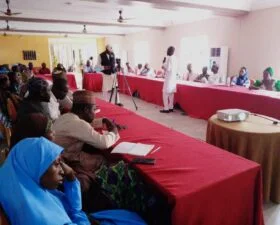Stakeholders in Kaduna State have gathered for a two-day validation workshop to review findings from a baseline research on community resilience, social cohesion, and livelihoods in tackling violent extremism.
The workshop, organised by the Partnership Against Violent Extremism (PAVE) Network under the KIRH Project, was aimed at validating research conducted across selected communities in eight local government areas of Kaduna State.
In an interview, Mr Eric John, PAVE State Coordinator, said the research focused on understanding how communities are affected by violent extremism, their coping mechanisms, and the role of youth and women in building resilience.
“The purpose is to assess past interventions under the SAP3 project, identify what worked, and scale up practical solutions for preventing violent extremism,” he said.
He added that the research covered communities in Kudan, Zaria, Chikun, Kachia, Jema’a, and Igabi LGAs, where youths and women had been supported through agricultural projects like poultry and cattle rearing.
John clarified that the goal was not to label any community as violence-prone but to understand the effectiveness of previous efforts and inform future programming.
Mr Aniebiet Ibanan, a researcher from the Institute for Peace and Conflict Resolution (IPCR), said the validation would guide national PCVE policies and interventions.
“IPCR is here to provide expert input and ensure that findings feed into strategic decision-making,” he said.
Ibanan urged participants to be intentional in their contributions and support the development of realistic, community-based solutions.
Also speaking, Grace Ayuba, Director of Home Affairs, Ministry of Internal Security and Home Affairs, commended the initiative, saying the ministry remained committed to protecting lives and property.
“Your input is valuable to the ministry’s ongoing efforts. We look forward to meaningful and fruitful deliberations,” she said.
Mr Alhassan Mohammed, Deputy Director, Ministry of Local Government Affairs, described the meeting as timely and critical for identifying gaps and setting actionable plans.
He stressed the need for structured programming and clear protocols to guide future interventions.
Mohammed congratulated the organisers and called for participants to be fully engaged in the discussions.
Participants at the event included representatives of government ministries, civil society, traditional institutions, and security agencies.
The workshop is expected to produce actionable policy recommendations to strengthen community-based approaches to preventing and countering violent extremism in Kaduna State.
(NAN)


